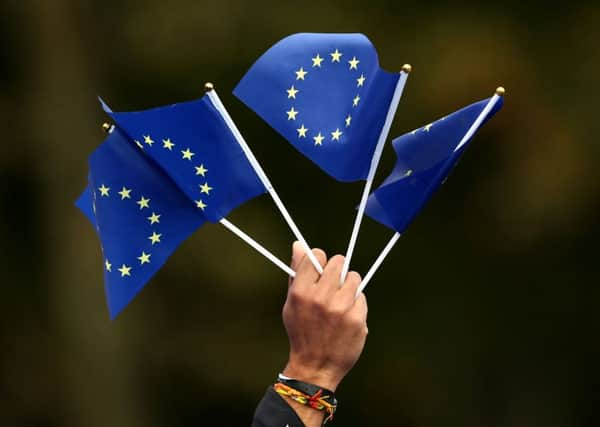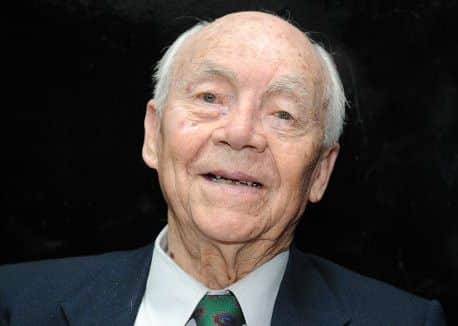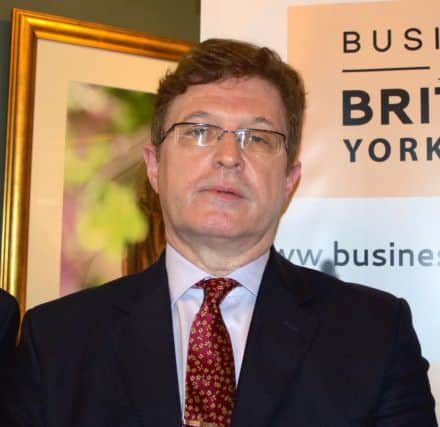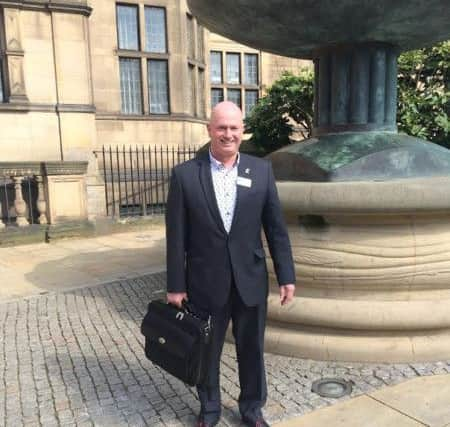EU REFERENDUM: Debating a case for Brexit from the EU


Voters in our region and across the country will be asked whether they wish for Britain to stay in the European Union – or to get out.


To help those who haven’t made their minds up yet – or to help reinforce your decision – we have asked a number of key political figures in our region to explain why they will be voting to leave.
Advertisement
Hide AdAdvertisement
Hide AdSir Patrick Duffy, former Sheffield Labour MP and President of the NATO Assembly
“Britain can thrive outside the EU.
With Europe at a dangerous intersection, the forthcoming referendum is more important than the last held 40 years ago. But it raises different questions. With a proposed constitution blocked, we wonder if the attempt to weld the ancient nations of Europe into a United States of Europe has run its course. Yet, the European system still exists: the Commission, Council, Parliament and Court of Justice. As do the European treaties from Rome to Nice and Lisbon, with the Single European Act thrown in. Has the European system only been halted? Or must there be a return to the normal sovereignty of nation states? That leaves the original starting point – a trading association a common market.


Common Market: In the 1970s I viewed the Common Market as a last line of defence for South Yorkshire’s collapsing steel, coal and engineering industries. Indeed, I led the Yes campaign locally in 1971. But I was acting in defiance of the wishes of my Attercliffe Labour party and had to face a sacking motion afterwards. I survived by 5 votes at a crowded meeting in Darnall.
The Sheffield District Labour Party, the Trades Council, the TUC and the Parliamentary Labour party were also against. As was an opinion poll conducted in Attercliffe by The Star. No one turned up at a meeting I arranged in Mosborough.
Advertisement
Hide AdAdvertisement
Hide AdThat opposition saw the Common Market as more than a matter of jobs and survival. There was a widespread suspicion of the Treaty of Rome. Was it a capitalist conspiracy? Where would it lead and what were its objectives? It was a thoughtful opposition that left me feeling uneasy. I was even more embarrassed during the referendum campaign in 1975 when the Yeses were able to outspend the Nos. All the big battalions fronted the Yes campaign, and the Nos could not compete with big business.
Labour leader Harold Wilson was then Prime Minister. He stayed cool and detached throughout, calling only for an informed debate. There was no scaremongering and hollow threats. No intervention by the American President or the Governor of the Bank of England.


The Common Market had now assumed the title of European Union, and enjoyed early support. Although it had many features that were against its interests, membership was appealing for Britain because of its own sickly economy. And especially welcoming when the Commission President, Jacques Delors, promised the TUC in 1988 social protection.
After the enrolment of newly liberated Baltic and eastern European states, however, Britain suffered a loss of voting strength in the ranks of Commission, Council and the EU parliament.
Advertisement
Hide AdAdvertisement
Hide AdEuropean Union: Nevertheless, Britain had enjoyed access to the world’s biggest single market. If at the cost of a large net contribution to the EU budget and regulation that some found burdensome. Others thought them offset by benefits in such fields as the environment, product safety and food standards. But there was a lingering feeling that the single market was primarily designed for German goods and French agriculture. The creation of a common currency in a Eurozone presented a more serious problem, because Britain and other members refused to join. It was the start of a divisiveness that has brought us to this referendum.
The nine-nations’ Common Market has become 28 members of the European Union. Treaties signed in Maastricht and Lisbon have radically altered our relationship with the EU, and considerably diluted British independence. The majority of our laws and directives are now derived from Brussels. Inevitably, and without personal fault, the workload of today’s MPs and the time spent at Westminster are much reduced compared to mine. Will Westminster soon have no more power than the old West Riding County Council?


As the EU economy has slowed since 1980, its share of world output has halved and its costs have risen. According to Germany’s Angela Merkel the EU now accounts for just over seven per cent of the world’s population, 25 per cent of its economy and yet 50 per cetn of global welfare spending. The eurozone still hovers on the edge of crisis with appalling youth unemployment in certain countries. Demographic trends continue to present long-term challenges. In consequence, the EU now takes under half of British exports - according to Eurostat. And they go to only six out of the 28 EU members - according to the Office of National Statistics. Our economy is thus less integrated into the rest of Europe, and becoming less so every year.
Against that background we can draw certain conclusions. First, the EU has morphed from a mere market into a quasi-federal state. Second, because its unelected Commission initiates policy, the EU is not a democratic institution, Third, with the EU unable to control its divergent members and their borders, there is mass immigration. Demonstrably, therefore, the EU is unsound in structure and incompetent in crisis management. Fourth, Angela Merkel’s reckless migrant’s appeal last year points to a lack of leadership and ‘togetherness’ in the EU. Clearly, the claims of David Cameron relating to the single market, to mass immigration and to defence need to be examined.
Advertisement
Hide AdAdvertisement
Hide AdSingle Market: If we are not members of the EU’s single market, we are told, we will not have access. Yet every country in the world has access. They will have to pay tariffs, of course, and comply with certain rules. But that does not deter a growing number of countries. Being outside the single market is obviously not a barrier.
A No vote would allow Britain to freely join world trading and standard-setting organisations. It would no longer have to put up with inept agricultural and fisheries policies. It would save on the EU budget when no longer a net contributor. It would be able to sign free-trade deals – like Germany and France – with other countries such as America, China, India and emerging economies, while retaining access to the single market.
In opting out of the EU we need not assume that our only alternatives are the Norwegian, Swiss or Canadian models. We would be free to negotiate a distinct British option; after Germany, we are the largest EU economy. With its crown jewels - the financial services of the city of London long coveted in Frankfurt and Paris - an independent Britain would be more attractive to global capital movements.
One option would no doubt be a Norwegian-style relationship. Thus giving us time to work out new arrangements. As a large economy we would find ourselves with greater influence than in the EU because big decisions are increasingly being taken now under the auspices of global bodies.


Advertisement
Hide AdAdvertisement
Hide AdMass immigration: David Cameron’s continuing omission hitherto of immigration in his public statements, as well as avoidance of BBC debate, can only be conjectured. But he must be aware of the acute anxiety arising from the current invasion of our ‘wide, open, home ports’. He must know of the downward pressure of mass immigration on wages. And of its major consequences for welfare and social cohesion. A clergyman in South Yorkshire has publicly revealed that in his own parish he now ministers to more than a hundred different nationalities. For the well-off immigration is a useful boon. But it is not such good news for those at the bottom of the heap. At its core, modern immigration is a class issue. Immigrants, by definition, compete with the poorest local people in the job market, in the housing market for access to health and schools. The tensions they fuel will grow relentlessly whilst Britain remains in the EU.
Defence: David Cameron’s stance on security and defence is also highly questionable. In fact his claim that a British exit from the EU could lead to war is dangerously wrong. It encourages the myth that the EU has helped preserve the peace. It is NATO, and NATO alone, that has given us our defensive umbrella. I am personally aware as a former Defence Minister and President of the NATO Assembly that the EU has increasingly tried to duplicate NATO. France has always wanted the US out of Europe. The EU is now trying once again to usurp NATO with its calls for a European Army. The plans are being kept secret from British voters until after the referendum.
Such a plan is dangerous also because it will cut deep into Russia. At the close of the Cold War I was anxious in Brussels to create a constructive place for Russia within any European security structure. Following personal talks with Mr Gorbachev I led a group that encouraged Russian in 1994 to join the Partnership for Peach programme. Despite Mr Gorbachev’s outreach to the West and the peaceful transfer from East to West of people and territory, however, it was the triumphalism of President George H.W. Bush that publicly took the credit.
That was just the beginning in Russia’s eyes of the rebuffs and broken promises that left Russia out in the cold. Eastward expansion by both NATO and the EU - involving countries that have old scores to settle – has followed. Inevitability, it has resulted in confrontation with Russia in a dysfunctional Ukraine. This has led to the emergence of a combative nationalism personified by Vladimir Putin. Inevitably, he is seen as the bad guy. Yet he enjoys popular support at home, and also that of the Orthodox Church.
Advertisement
Hide AdAdvertisement
Hide AdAt a joint NATO/ EU conference in Paris a year ago I warned of the dangers of that joint eastward expansion. I pointed out also that most countries were ‘free riders’, relying on the US and the UK – with its new aircraft-carriers – to shoulder more than three quarters of Europe’s defence budget. I told a crowded gathering that ‘it was time they started to pay their dues’. It was not well received.
Happily, in NATO we have a proven instrument of defence. Just as long as it is wary of EU involvement. For the EU has become a source of instability and danger. With its 28 bickering and veto-wielding members, furthermore, it can leave Britain isolated in decision-taking. As we are reminded by the Eurovision Song Contest with its clustered and geographically tactical voting patterns. Fortunately, Britain does not depend on the EU for weapon systems and their procurement. And in the vital area of intelligence, it has a special relationship with the US, Canada, Australia and New Zealand in the Five Eyes Alliance.
Brighter vision: All in all, the EU no longer works for us. David Cameron was refused mild reforms. Not that the EU isn’t changing. But where is it for the better? Of our top three destinations for exports, only Germany – according to Eurostat – is in the EU. In today’s globalised world, we need, therefore, to look outwards. Realistically, we are part of a global arch from London to Dublin (once again the fastest-growing EU economy) across the Atlantic to North America, and down to Australia and New Zealand. This is our innovative world. That is where Amazon, Google, Uber and Netflix originated, not in the EU. That is where important foreign direct investment also originates, assisted by the city of London’s peerless capital market.
It is also an inter-linked web of culture, language and family. It appeals to Business for Britain Yorkshire, a group of local business leaders who are campaigning for Britain to leave the EU.
Advertisement
Hide AdAdvertisement
Hide AdOpen seas: Whenever Britain has had to choose between Europe and the open seas, she has chosen the great blue yonder. That is where she has found and fostered new trade routes, under the protection of the Royal Navy. Dare do it once again on our own? Or do we timidly follow Hilaire Belloc’s advice: ‘Always keep a hold of Nurse, for fear of finding something worse’?
In the summer of 1940, when I joined the Home Fleet, Britain was looking into the abyss. All our allies in Europe had gone down and our army was on the run. Yet there was an extraordinary sense of relief among new shipmates. We might now be on our own, some said. But we know where we stand, and won’t be defeated. We are in desperate need of the same steel and resolve. Other countries will then rally to our standard. And as they did then, we will do so without Nurse.”
Carl Chambers, regional chairman of Business for Britain, Yorkshire
“This region has a once in a lifetime opportunity to escape the failed concept that is the European Union. The upcoming referendum is our chance to make our economy stronger – that’s the bottom line.
Advertisement
Hide AdAdvertisement
Hide AdFor as long as I can remember, we’ve been told the EU will get better – that costs and bureaucracy will be curtailed – but that hasn’t materialised. David Cameron returned from Brussels in February with anything but fundamental change to benefit Britain. The EU courts are still in control of our borders and our laws, and Yorkshire and the Humber sends £1.095 billion to the EU every year, instead of spending it on our priorities here.
The UK is the world’s fifth largest economy. If we vote to leave, we can leverage that position to build our economy further. We face a choice between regionalisation or globalisation, and as a strong economy we no longer stand to gain from the “fortress EU” approach in the same way other, weaker economies do. Western economies are no longer the only show in town, and we should be looking to markets further afield to build relationships, without the prohibitive EU rules to stop us.
I have absolutely no doubt that following a vote to leave the EU, our country would secure trade agreements allowing us to supply the rest of Europe. It’s in the very essence of trade agreements that they benefit both parties. German manufacturers need to sell us their Mercedes, BMWs, Audis and VWs, and French producers need us to continue buying wine, cheese and farm produce. Britain is Europe’s largest export market, ahead of the USA. To suggest we’d be risking losing these trade links, the manufacturers that create jobs here and the investment that comes with it, is laughable.
This type of scaremongering is exactly the same as when we decided not to join the Euro. As I recall, there was talk of losing millions jobs if we didn’t join. Look what happened there.
Advertisement
Hide AdAdvertisement
Hide AdIn some parts of the EU, unemployment is 25 per cent and youth unemployment is more than 50%. It’s the worst situation since the 1930s and the EU is ill equipped to deal with it. It suffers low growth, high unemployment, a dysfunctional currency and a culture that is not friendly to technology and entrepreneurs. Its regulatory system is based on a slow, broken 1950s bureaucracy that cannot fix problems fast. If we leave, we will save the millions of pounds every year that are diverted for use by the EU. We can use those funds on our own terms to invest in things we choose to, such as skills and infrastructure.
The UK is a net contributor to the EU. That means we pay in more than twice what we get back. By coming out of the EU Britain would not just be able to continue funding its domestic agencies and organisations that benefit from EU funds, but also make a substantial investment in the country and our region.
Ask yourself which is safer: a vote for the permanent supremacy of EU law, or a vote to take back control? I know what my answer is, which is why I will Vote Leave on June 23 and take back control.”
Coun John Booker, deputy leader of Ukip Sheffield
“Nothing has divided the United Kingdom more in the last forty years than the EU. When we joined the EEC as it was known then in the early seventies, I believe this was the greatest political blunder in our history. This undemocratic, incompetent and corrupt organisation is changing the UK beyond all recognition and not for the better. This great country has given the world and its citizens so much, the time has come to give something back, freedom, democracy, sovereignty.
Advertisement
Hide AdAdvertisement
Hide AdWe the people must take back the power from the political elite, they have used it poorly, we must use it wisely, vote for the UK and against the EU. The unelected bureaucrats in Brussels are terrified that Britain is having an EU Referendum, they fear quite rightly that this will encourage other member states to hold national referendums, which in turn could lead to one or more exits, and then the whole caboodle could come crashing down like the Walls of Jericho.
The conduct of our Prime Minister, David Cameron has been disgraceful, he is running scared,with every new apocalyptic vision and ridiculous statement regarding the negative side of leaving the EU, he insults the intelligence of the British people.
We are not voting for a Government, we are voting for the future of our country and everyone in it. I ask two questions, do you want to be British or European? Do you want to be ruled by our country or by a foreign country?”